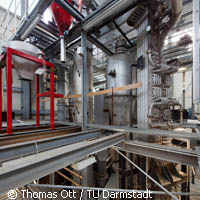EU-funded researchers target innovative methods to cut emissions
The Technische Universität Darmstadt in Germany has set up a pilot plant to test two innovative methods for carbon dioxide (CO2) capture that require less energy and lower operating costs than earlier approaches. The scientists are investigating the so-called 'carbonate looping' and 'chemical looping' methods for CO2 capture. EU support for the project amounts to EUR 1.1 million under the Research Fund for Coal and Steel. It is well documented that the combustion of fossil fuels, such as coal, fuel oil or natural gas, liberates large quantities of CO2 that significantly contributes to global warming. Carbon capture and storage (CCS) is being touted as one of the key technologies that could reduce emissions and lead to more environmentally friendly power plants. Environmentalists claim that CCS might be able to reduce CO2 emissions from fossil fuels used by industry to near zero and thereby help reduce greenhouse-gas emissions. However, as the researchers noted, early approaches to CO2 capture required expending significantly more energy and entailed bigger operating costs, therefore raising questions about their efficiency and acceptance. The two new methods for CO2 capture being investigated by the TU Darmstadt's Institute for Energy Systems and Technology's pilot plant will allow CO2 emissions to be nearly totally eliminated, require virtually no additional energy input and entail only slight increases in operating costs, according to the researchers. Dr Bernd Epple and his 26 colleagues are putting the 'carbonate looping' and 'chemical looping' methods for CO2 capture through their paces. TU-Darmstadt has built a new, 20-metre high experimentation hall on its Lichtwiese campus to house the pilot plant, which took 20 months to build. Both methods being tested use natural substances and reduce the energy currently needed for CO2 capture by more than half, the team explained. Dr Epple said, 'These methods represent milestones on the way to CO2-free power plants. They might allow coal-fired, oil-fired, and natural-gas-fired power plants to reliably and cost-effectively generate power without polluting the environment.' The carbonate looping method uses naturally occurring limestone to initially bind CO2 from the stream of flue gases that transit the power plants' stacks in a first-stage reactor. The resultant pure CO2 is re-liberated in a second reactor and can then be stored. The advantage of the carbonate-looping method is that even existing power plants can be retrofitted with this new method, the researchers said. They added that on new power plants, the chemical looping method will even allow CO2 to be captured with hardly any loss of energy efficiency. Under this method, a dual-stage, flameless, combustion yields a stream of exhaust gases containing only CO2 and water vapour. The CO2 can then be captured and stored.
Countries
Germany



